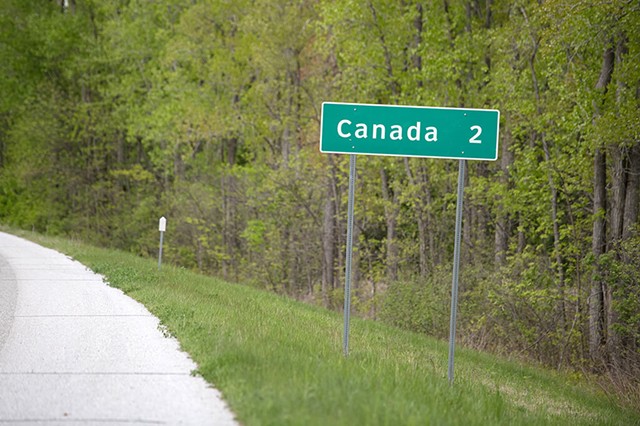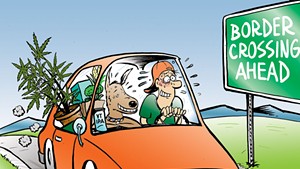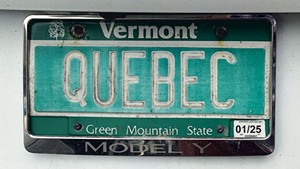
- Daria Bishop
- Approaching the U.S. Canadian Border on I-89
Despite living a little more than an hour from Canada, I've been there exactly once in the past 15 years. It was for an impromptu New Year's Eve trip to Montréal with friends in 2010 that I was pretty sure would end before it started. That's because about a year earlier, owing to a youthful indiscretion — or, more accurately, stupidity — I was arrested in Shelburne for drunk driving.
DUI is a serious crime in the U.S., but Canadians view it even more harshly. It's a felony there, and having one on your driving record, even if it didn't happen in Canada, can prevent you from entering the country.
Through some fluke of divine intervention — or maybe a negligent border agent — I was able to enter Canada in 2010 without issue, much to my surprise. I've been reluctant to try again, having heard stories of others with DUIs being turned around at the border. So I've missed out on more than a decade of major concerts, hockey games, Nordic spas, poutine and IKEA.
Part of the reason was that info on how, or even if it's possible, to enter Canada with a beer-stained driving record was hard to come by — or was in French. Over the years I'd heard all manner of mostly unreliable theories from friends, acquaintances and a Greek chorus of Burlington barflies on the subject:
You need to wait five years. Easy-peasy.
No, no, dude, it's 10 years.
I'm pretty sure you can just write a letter to Canada and they'll let you back in.
Nope, you have to pay thousands of dollars ... and write a letter.
Actually, you're screwed and can never go to Canada again and are hereby banished to America for all eternity to ponder your poor life choices. Au revoir, motherfucker.
It turns out, there's a nugget of truth to most of those suggestions. You can petition the Canadian government and/or pay your way back into its good graces — provided it's been five years since your sentence has been completed. Or, as deputy news editor Sasha Goldstein discovered in his research for the story accompanying this one, the offense was old enough that I should no longer be barred from visiting Canada.
I trust Goldstein's reporting, but my eligibility to return was still purely theoretical. So at the urging of publisher Paula Routly, I headed north to see what would happen. Nearing Swanton, the second-to-last exit on Interstate 89 before Canada, I realized I was gripping the wheel more tightly than usual.
Passing the green sign marking the 45th parallel — the midpoint between the equator and the north pole and also the farthest north I'd been in years — butterflies fluttered in my stomach. Holy shit, I thought as I approached the Highgate crossing into Québec. I'm actually nervous.
While waiting in line behind another car, I tried to cool my nerves by going over my story one last time: I'm a Vermont journalist traveling to Canada on assignment and will only be in the country for a few hours. Pretty please, may I enter your magical fairyland of charming accents and free health care?
When it was my turn, I pulled forward to the booth and was greeted by a stoic woman in her thirties wearing a bulletproof vest.
"ID, please," she said flatly in a heavy French Canadian accent.
"Oh, I'm fine, thanks!" I blurted out. "How are you?"
The agent cocked her head and repeated herself.
"Sorry, long day," I said, flustered, handing over my driver's license.
Without responding the agent began examining my ID. After a few long minutes, she addressed me again.
"Do you have a passport or an enhanced ID?" she asked.
My passport is expired, but I had renewed my license during the pandemic and thought it was enhanced. I realized with growing dread in that moment I had never actually checked to make sure.
"Oh, geez, I thought that was an enhanced ID?" I responded.
"It is not," she said.
I nodded, expecting that the next thing she said would be instructions to turn around. Instead, she asked, "You are an American citizen?"
I nodded.
"And what is your reason for coming to Canada?"
I went through my spiel. When I was done, she looked at me sternly.
"OK," she said, handing my license through the window. "You can go. But next time, you really need a passport or enhanced ID, OK?"
Shocked, I thanked her. But as I reached for my ID, I realized the $64,000 question — that's $84,617 Loonies — had never come up: She hadn't mentioned my DUI. In a flash, I weighed the pros and cons of asking about it. Though every instinct said not to, I went for it.
"Soooo ... one last question," I watched myself say as if having an out-of-body experience. "I had a DUI, like, 15 years ago. Is that a problem?"
The agent yanked my ID back and rolled her eyes.
"Pull ahead and park to the left," she instructed me, clearly irritated. "You need to go inside and speak to a customs agent."
I waited inside the customs office for five minutes, seated on a bench beneath a message board plastered with missing persons notices. Then a burly, imposing agent with a dark beard and slicked-back hair wearing a bulletproof vest and a sidearm called me to the desk.
"You had a DUI?" he asked in an even thicker accent than the agent in the booth.
"Yes, about 15 years ago," I replied meekly.
"Anything since?"
"Uh ... nope."
The agent looked at my ID, then at me.
"OK, have a good day," he said, handing over my license.
I thanked him and turned, heading for the door and, for the first time in years, Canada.
Then, from behind me: "Oh, but next time have the right ID, OK?"











Comments
Comments are closed.
From 2014-2020, Seven Days allowed readers to comment on all stories posted on our website. While we've appreciated the suggestions and insights, right now Seven Days is prioritizing our core mission — producing high-quality, responsible local journalism — over moderating online debates between readers.
To criticize, correct or praise our reporting, please send us a letter to the editor or send us a tip. We’ll check it out and report the results.
Online comments may return when we have better tech tools for managing them. Thanks for reading.